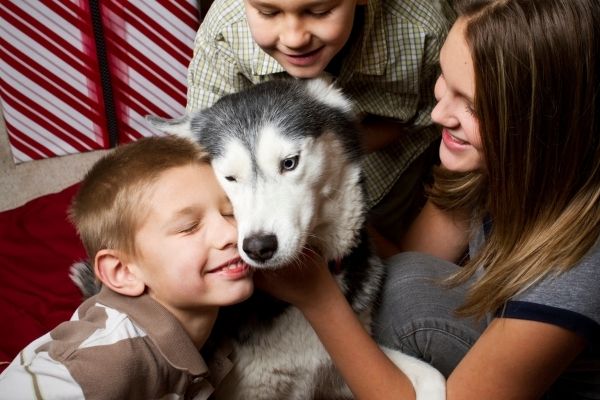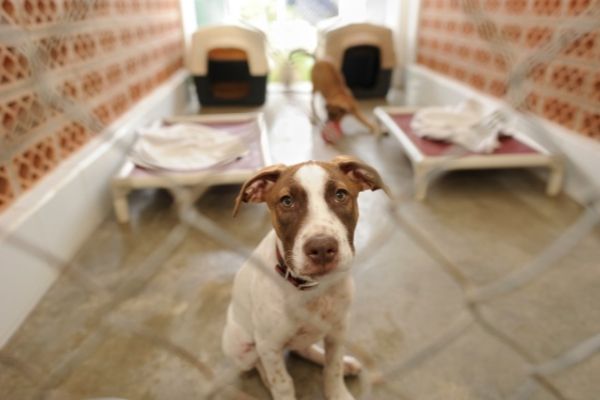This is Part 1 in a 4-part series on pet adoption.
Coming next:
Part 2: 4 Important Decisions to Make Before Adopting a Dog
Part 3: 15 Tips for Socializing Your Puppy
Part 4: 6 Steps to Introduce a New Dog to Your Current Dog

Bringing a furry friend into your family is a fun and challenging adventure.
No matter what their age when you adopt them, all dogs require lots of care and attention. Particularly if you’re a first-time dog parent, it’s important to know what’s realistic, in terms of the time you must devote to training, socializing, and exercising your dog.
Puppies require round-the-clock care
The first year and a half of a dog’s life is equivalent to humans from birth to age 18!

Like human toddlers, puppies seem to be everywhere at once. These active balls of fur are easily distracted. They are messy. They have accidents. They may whine, howl, bark incessantly, and chew things. They need frequent potty breaks, feeding, playtime, and walks throughout the day.
Dogs are mentally and emotionally immature until age 2 or 3. It’s critical to make sure your young dog receives constant attention, ongoing socialization, training, and plenty of exercise during this developmental period.
If you work long hours, are rarely home, or you travel often (without your pet), it’s best to adopt an adult dog (or none at all).
Which is the best choice for you: a puppy, adult dog, or senior dog?
The information and questions below will help you assess the type of canine companion that will best fit your lifestyle, energy level, and schedule.
Size

Mixed-breed puppies can present you with some interesting surprises. What you had assumed would be a smallish lapdog may grow (and grow, and grow!) to monstrous proportions.
Question to ask yourself:
Am I emotionally prepared to parent a dog that grows much larger (or shaggier) than what I expected?
Temperament

Similar to a dog’s size, you can’t predict how a puppy’s temperament may change as she matures. When your new pup first enters your family, she will likely be nervous. After all, she has just been separated from her mom and siblings – from everything she’s ever known.
In the same manner, when you adopt an adult dog from a shelter or a rescue foster home, it can take anywhere from days to several weeks for your dog to acclimate to her new home and develop trust in you (longer, if she is coming from an environment where she was neglected or abused).
Question to ask yourself:
Am I willing to devote whatever time, training, and loving attention it takes to help my dog adjust to her new home?
Health

When you adopt either a puppy or an adult dog from a shelter or a rescue organization, you should expect potential health issues:
- inherited or undiagnosed conditions or behavioral problems
- inadequate pre-natal or post-natal care
- lack of veterinary care and routine vaccinations
Questions to ask yourself:
-
Am I prepared to deal with unexpected behaviors and/or medical issues that may be a result of my dog’s history?
-
Have I been made aware of any known medical issues this dog has?
-
When was the dog’s most recent wellness exam?
-
Has the dog received necessary vaccinations and parasite treatment?
-
Have I budged appropriately for immediate, ongoing, and emergency veterinary care throughout the life of my dog?
-
Am I financially secure enough to pay a potentially costly vet bill during the first week/months after my dog is in my home?
Further Reading:
12 Tactics to Help Your Pet Have a Fear-Free Veterinary Visit
The Perfect Dog Breed for You, Based on Your Enneagram Personality Type
Training
In many cases, a young puppy will not have received any training. You will be responsible for crate training, potty training, leash training, grooming, and socializing your pup.
While most adult dogs will be potty trained, re-training may be needed in other areas.
Questions to ask yourself:
How much time and energy am I willing to immediately devote to training or retraining my dog in these areas:
-
Crate training
-
Potty training
-
Leash training
-
Grooming – If you plan to bring your adult dog to a groomer, find out whether they’ve visited a groomer before, and what the experience was like for your dog). Will your dog feel comfortable with you giving him a bath, trimming his nails, and cleaning his ears?
-
Socialization training – Your puppy or grown dog needs to learn how to behave and interact with people and other animals.
Further Reading:
15 Tips for Socializing Your Puppy in a Socially Distant World
10 Tips for a Safe and Fun Off-Leash Dog Park Outing
After you have given serious thought to the questions above, ask yourself this final, important question:
Is a dog (puppy or adult) a good fit for my current lifestyle?
Like human children, your fur baby will be a family member. Does your situation in life, your income, and your availability allow you to fully commit to caring for your new family member?
If your answer is a resounding “Yes!” we suspect that you’ll find dog parenting a rewarding experience.


